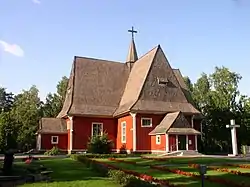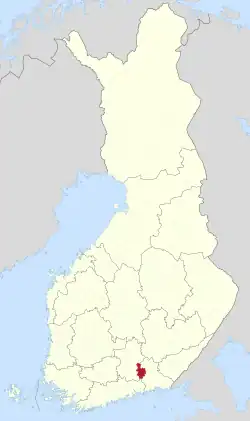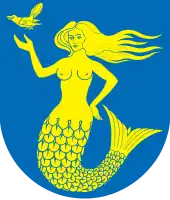Iitti
Iitti (Finnish: [ˈiːtːi]; Swedish: Itis) is a municipality of Finland. It is located in the province of Southern Finland and is part of the Päijänne Tavastia region.[5] The municipality has a population of 6,463 (19 September 2023)[2] and covers an area of 687.09 square kilometres (265.29 sq mi) of which 97.27 km2 (37.56 sq mi) is water.[1] The population density is 10.96 inhabitants per square kilometre (28.4/sq mi). The administrative center of Iitti is in the village of Kausala.
Iitti
Itis | |
|---|---|
Municipality | |
| Iitin kunta Itis kommun | |
 Church | |
 Coat of arms | |
 Location of Iitti in Finland | |
| Coordinates: 60°53′N 026°20′E | |
| Country | |
| Region | Päijänne Tavastia |
| Sub-region | Lahti sub-region |
| Charter | 1865 |
| Seat | Kausala |
| Government | |
| • Municipality manager | Jarkko Salonen |
| Area (2018-01-01)[1] | |
| • Total | 687.09 km2 (265.29 sq mi) |
| • Land | 589.81 km2 (227.73 sq mi) |
| • Water | 97.27 km2 (37.56 sq mi) |
| • Rank | 142nd largest in Finland |
| Population (2023-09-19)[2] | |
| • Total | 6,463 |
| • Rank | 143rd largest in Finland |
| • Density | 10.96/km2 (28.4/sq mi) |
| Population by native language | |
| • Finnish | 97.6% (official) |
| • Swedish | 0.2% |
| • Others | 2.1% |
| Population by age | |
| • 0 to 14 | 14% |
| • 15 to 64 | 54.5% |
| • 65 or older | 31.5% |
| Time zone | UTC+02:00 (EET) |
| • Summer (DST) | UTC+03:00 (EEST) |
| Climate | Dfc |
| Website | www.iitti.fi |
Neighbour municipalities are Heinola, Kouvola, Lapinjärvi, Lahti and Orimattila. The municipality is unilingually Finnish.
In 1990, the center of Iitti, which surrounds the old parish church, was voted the most attractive kirkonkylä ("church village") in Finland.
The Kymi Ring motor sport center is located in Iitti, right next to the border of Kouvola.
History

The surroundings of lakes Urajärvi and Pyhäjärvi have been known to be exploited as wilderness since the Stone Age, although no signs of permanent habitation from the era have been found, and the area is presumed to have been entirely uninhabitated in the interim between the Stone Age and the conversion of Finland to Christianity. By the end of paganism, Iitti had gained its first permanent inhabitants first from Hauho and Vanaja, as well as later on from Hollola.[6]
The oldest village in Iitti is presumed to be Kauramaa, though several others are mentioned in documents dating to the Middle Ages. Administratively, Iitti was a chapel subordinated to the parish of Hollola until 1539, after which it became an independent parish that also included Nastola, Jaala, Valkeala and parts of Mäntyharju, by proclamation from Gustav I. At this time, Iitti had 14 villages and 89 estates.[6]
Iitti suffered greatly over the Russo-Swedish War of 1788–1790, becoming a battleground as well as a headquarters for Swedish forces. The battle of Tillolankangas was one of the bloodiest over the entire war in Finland; the Swedes' victory cemented the liberation of the villages around river Kymi. Over the course of the war, 13 villages were destroyed in Iitti.[6]
Until 2021, Iitti was part of the Kymenlaakso region before it became part of Päijänne Tavastia.[7]
Geography
Demographics
In 2020, 14.0% of the population of Iitti was under the age of 15, 55.2% were aged 15 to 64, and 31.5% were over the age of 64. The average age was 48.8, above the national average of 43.4 and regional average of 46.4. Speakers of Finnish made up 97.9% of the population and speakers of Swedish made up 0.2%, while the share of speakers of foreign languages was 1.9%. Foreign nationals made up 1.4% of the total population.[8]
At the end of March 2021, the population of Iitti was 6,590. The chart below, describing the development of the total population of Iitti from 1975 to 2020, encompasses the municipality's area as of 2021.
|
| ||||||||||||||||||||||||||||||||||||
| Source: Statistics Finland[9] | |||||||||||||||||||||||||||||||||||||
Urban areas
In 2019, out of the total population of 6,711, 3,946 people lived in urban areas and 2,705 in sparsely populated areas, while the coordinates of 60 people were unknown. This made Iitti's degree of urbanization 59.3%.[10] The urban population in the municipality was divided between two urban areas as follows:[11]
| # | Urban area | Population |
|---|---|---|
| 1 | Kausala | 3,702 |
| 2 | Iitti parish village | 244 |
Economy
In 2018, 10.2% of the workforce of Iitti worked in primary production (agriculture, forestry and fishing), 35.9% in secondary production (e.g. manufacturing, construction and infrastructure), and 50.8% in services. In 2019, the unemployment rate was 9.2%, and the share of pensioners in the population was 35.8%.[12]
The ten largest employers in Iitti in 2019 were as follows:[13]
- Halton Oy, 257 employees
- Municipality of Iitti, 199 employees
- Päijät-Häme Health Care Municipal Consortium, 149 employees
- Kiitokori Oy, 61 employees
- Kymen Seudun Osuuskauppa, 46 employees
- SharpCell Oy, 42 employees
- Dinair Clean Air Oy, 40 employees
- Iitin Ehtookotiyhdistys ry, 31 employees
- Kausalan Matkakeidas Oy, 29 employees
- Kaupe Oy, 21 employees
Notable residents
- Lasse J. Laine – naturalist
References
- "Area of Finnish Municipalities 1.1.2018" (PDF). National Land Survey of Finland. Retrieved 30 January 2018.
- "Finland's preliminary population figure was 5,587,841 at the end of August 2023". StatFin. Statistics Finland. Retrieved 30 September 2023.
- "Demographic Structure by area as of 31 December 2022". Statistics Finland's PX-Web databases. Statistics Finland. Retrieved 6 September 2023.
- "Population according to age (1-year) and sex by area and the regional division of each statistical reference year, 2003–2020". StatFin. Statistics Finland. Retrieved 2 May 2021.
- Päijät-Häme 2021 (in Finnish)
- Soikkanen, Mauri; Erävuori, Jukka; Korpela, Kalevi; Penttilä, Antero; Mäkinen, Vesa (1968). "Iitti". Suomenmaa 2: maantieteellis-yhteiskunnallinen tieto- ja hakuteos. 2: Heinola–Kaavi. Helsinki: WSOY.
- Korhonen, Antti-Jussi (31 December 2020). "Iitti vaihtaa maakuntaa huomenna – kaikkiaan viisi kuntaa vaihtaa maakuntaa". Yle (in Finnish). Retrieved 26 September 2022.
- "Key figures on population by region, 1990-2020". StatFin. Statistics Finland. Archived from the original on 6 April 2019. Retrieved 28 April 2021.
- "Population according to age (1-year) and sex by area, 1972-2020". StatFin. Statistics Finland. Archived from the original on 25 May 2019. Retrieved 27 April 2021.
- "Degree of urbanisation by area, 2019". StatFin. Statistics Finland. Archived from the original on 26 November 2019. Retrieved 26 April 2021.
- "Population in urban settlements and sparsely populated areas by age, sex and municipality, 2019". StatFin. Statistics Finland. Archived from the original on 26 November 2019. Retrieved 26 April 2021.
- "Municipal key figures 1987-2020 (with the 2021 regional division)". StatFin. Statistics Finland. Retrieved 26 April 2021. (2018, 2019 and 2020)
- "Kunnittainen toimipaikkatilasto" (in Finnish). Statistics Finland. Retrieved 29 April 2021.
External links
 Media related to Iitti at Wikimedia Commons
Media related to Iitti at Wikimedia Commons- Municipality of Iitti – Official website Finnish, Swedish, English and German languages
